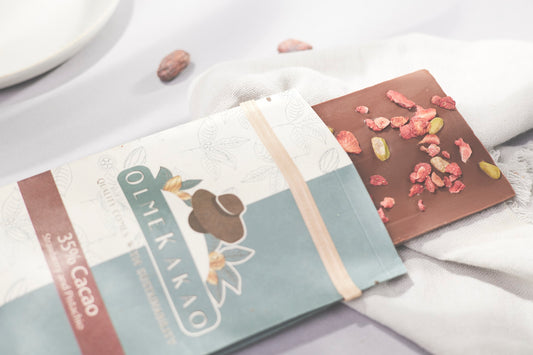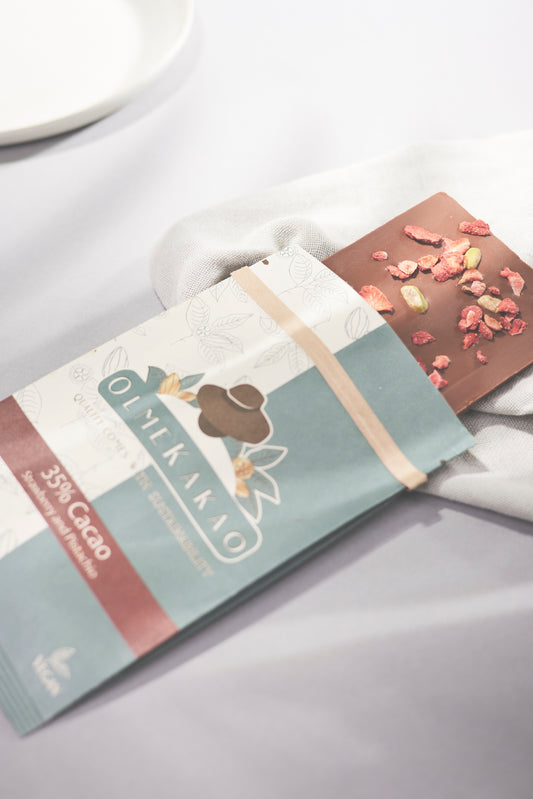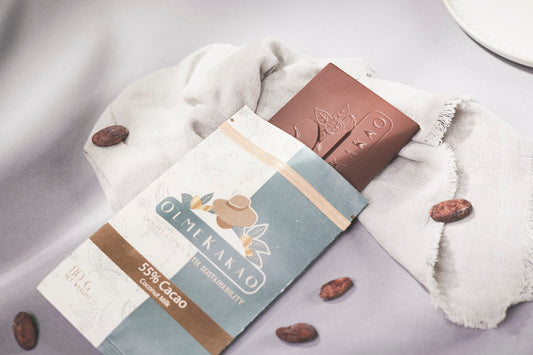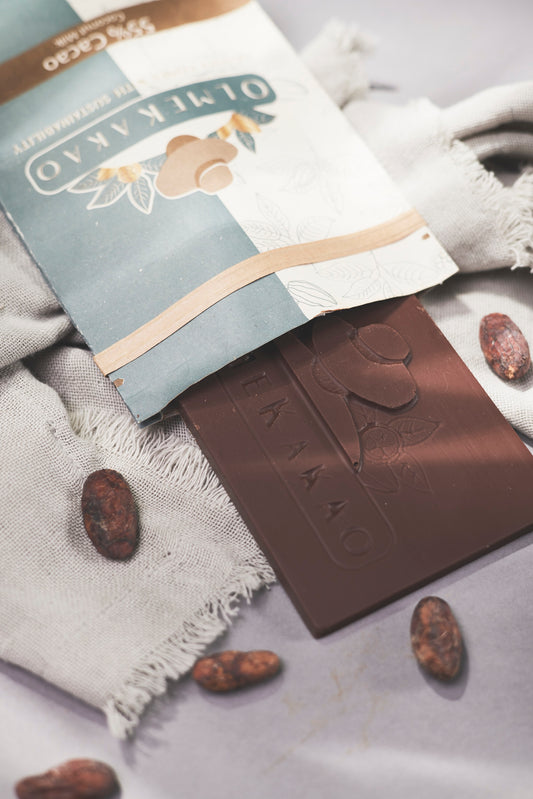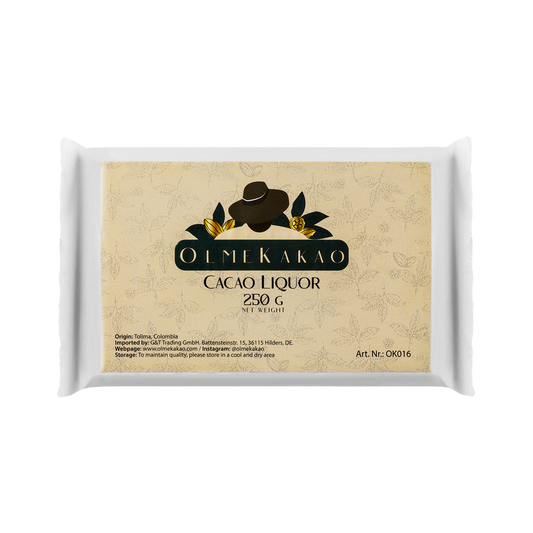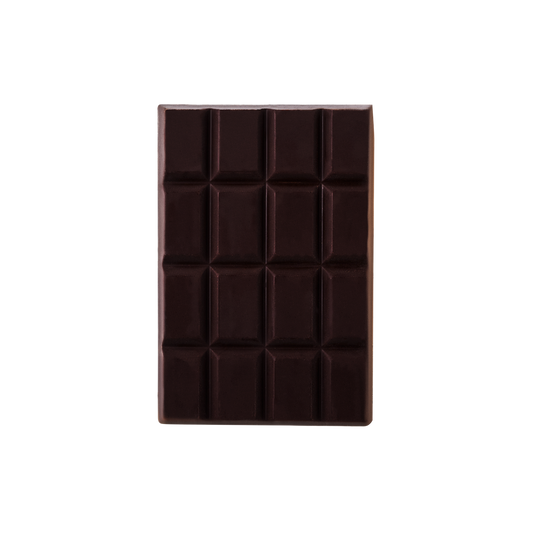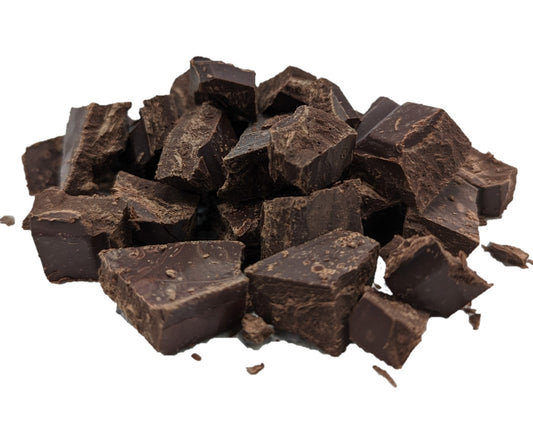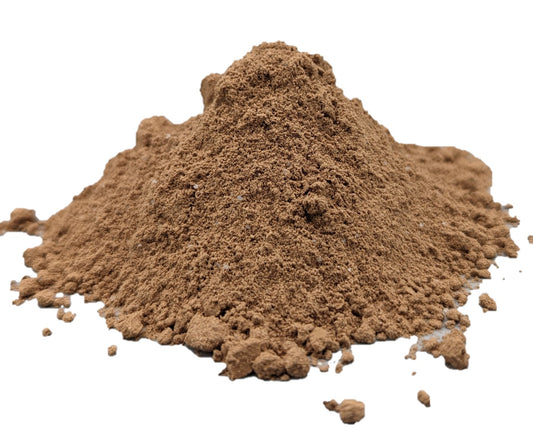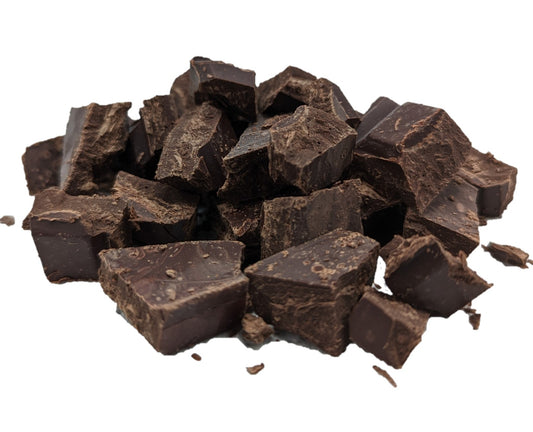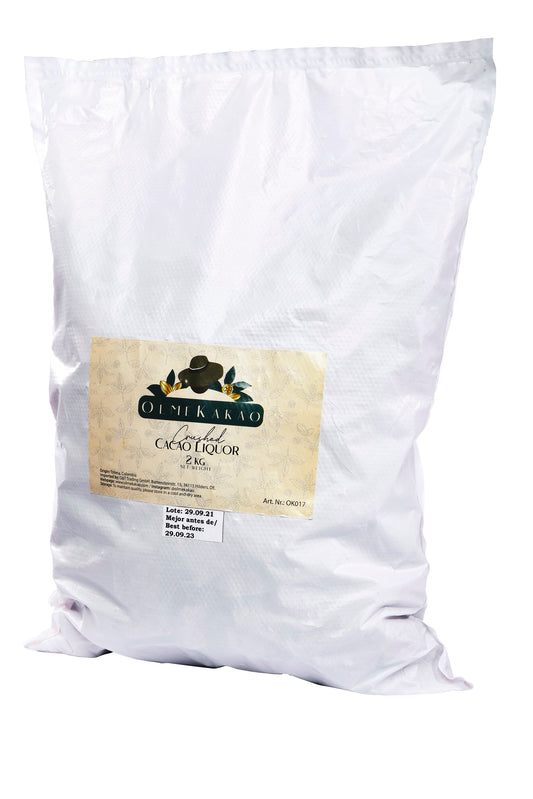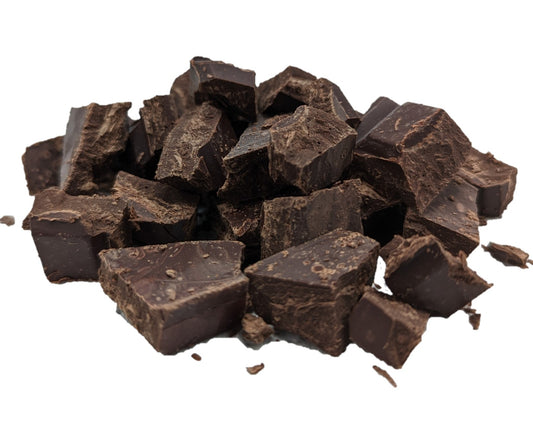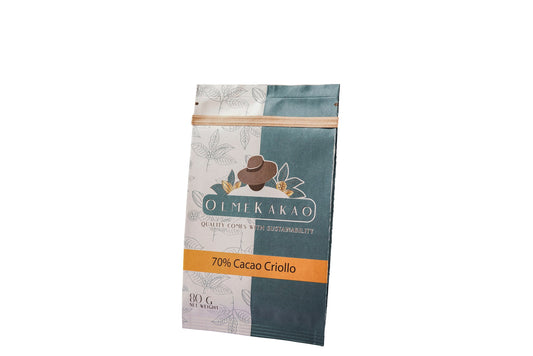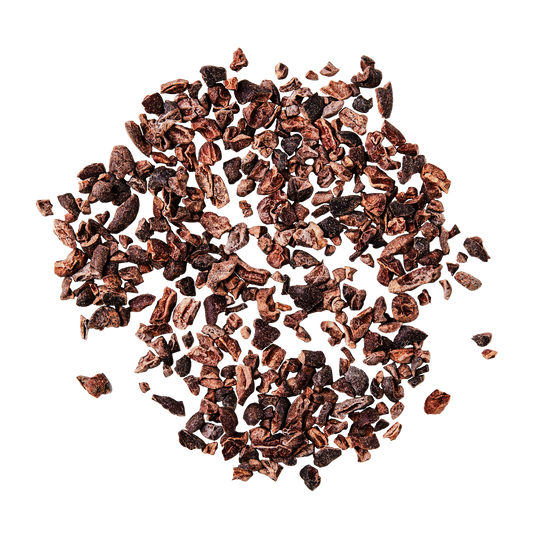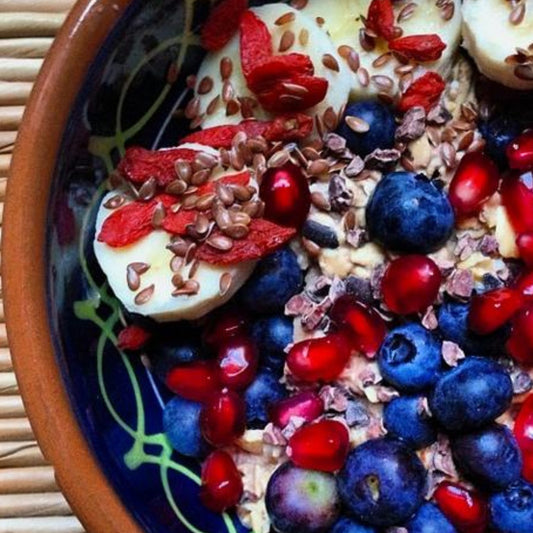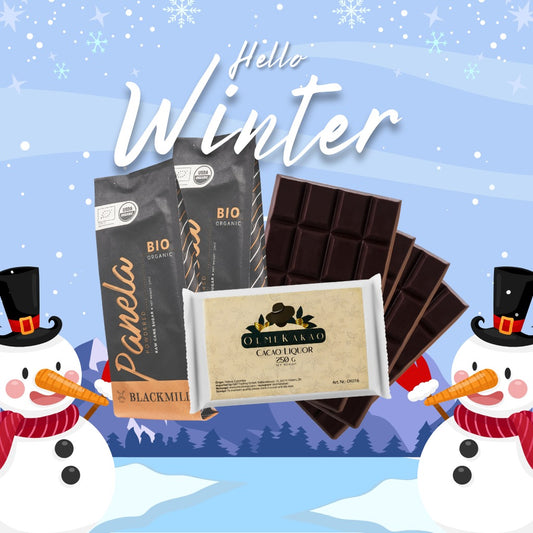Collection: Chocolate / Cocoa
"Olmakakao" stands for exclusive chocolates made from fine cocoa from small farmers in Colombia , grown in sustainable mixed cultures . Our range extends from tasty bars , some of which are vegan, to cocoa powder for drinking chocolate . We also offer raw cocoa products for manufacturers and confectioners .
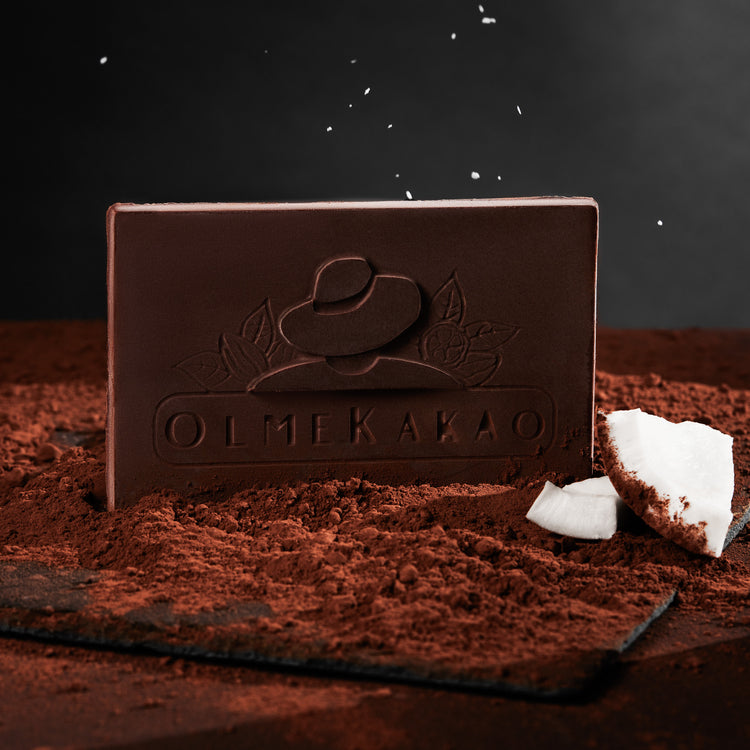
-
Olmecacao vegan chocolate 35% cocoa content Criollo with strawberry and pistachio 80g
Vendor:OlmekakaoRegular price €2,99 EURRegular priceUnit price / per€4,99 EURSale price €2,99 EURSold out -
Olmekakao vegan chocolate 55% cocoa Criollo with coconut milk 80g
Vendor:OlmekakaoRegular price €4,99 EURRegular priceUnit price / per -
Olmecacao - Ceremonial cocoa / ritual cocoa - 100% raw cocoa mass 0.25kg (2x125g bars)
Vendor:Olmekakao5.0 / 5.0
(1) 1 total reviews
Regular price €9,98 EURRegular priceUnit price €39,92 / per kg€12,98 EURSale price €9,98 EURSale -
Olmekakao Cocoa Licor Crushed 1 kg Doypack
Vendor:OlmekakaoRegular price €29,99 EURRegular priceUnit price / per -
Olmekakao Cocoa Licor Powder 0.5 kg Doypack
Vendor:OlmakakaoRegular price €12,84 EURRegular priceUnit price / per -
Olmekakao 100% cocoa mass from Criollo fine flavor cocoa beans 2kg
Vendor:OlmekakaoRegular price €39,94 EURRegular priceUnit price / per -
Olmekakao Cocoa Licor Crushed 5 kg Bag
Vendor:OlmekakaoRegular price €53,50 EURRegular priceUnit price €10,70 / per kg -
Sold out
Olmecacao White Chocolate Bar 80g
Vendor:OlmekakaoRegular price €4,99 EURRegular priceUnit price / per -
Olmekakao Chocolate Bar 70% Criollo 80g
Vendor:OlmekakaoRegular price €4,99 EURRegular priceUnit price / per -
Olmecacao cocoa nibs - roasted
Vendor:Col-SpiritRegular price From €11,90 EURRegular priceUnit price €23,80 / per kg -
Winter Chocolate Bundle - 1kg pure chocolate with 1kg organic panela
Vendor:Col-SpiritRegular price €35,00 EURRegular priceUnit price / per€49,90 EURSale price €35,00 EURSale
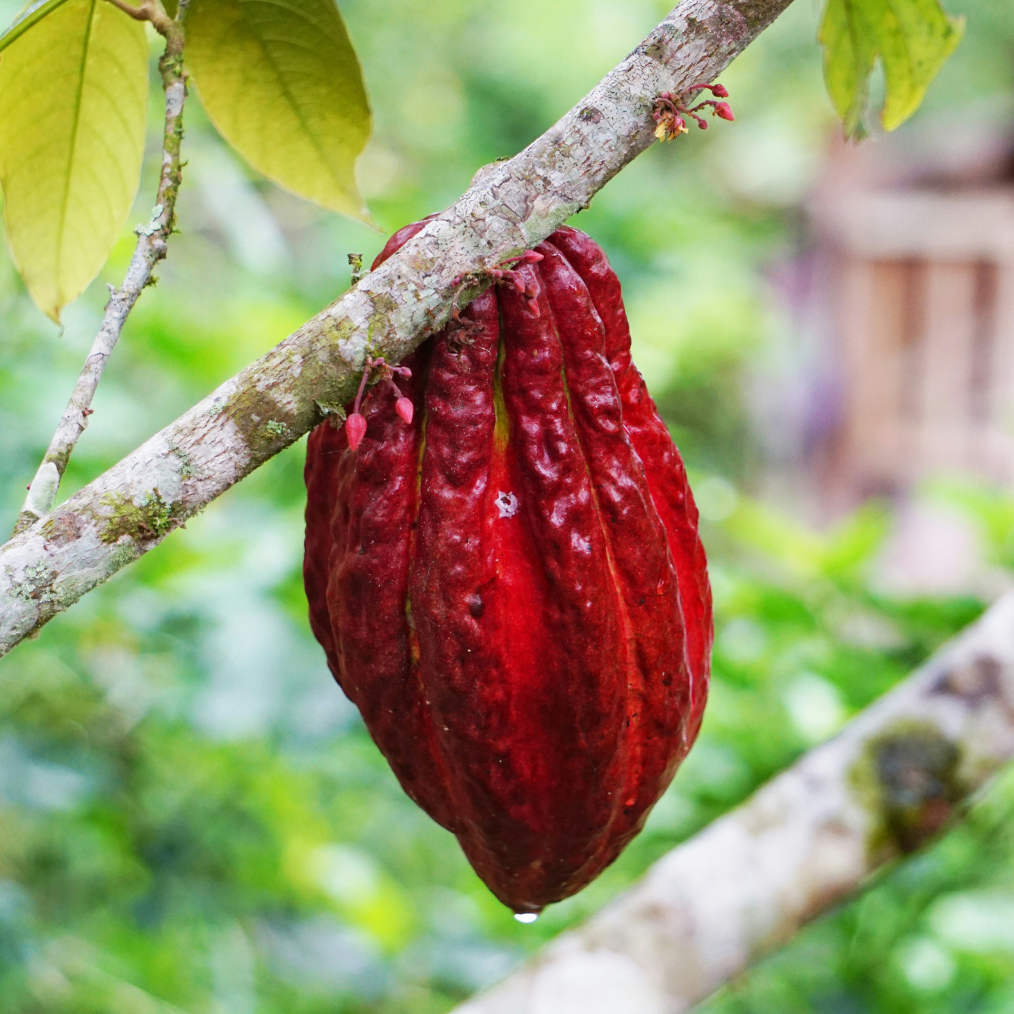
Olmakakao – Exclusive chocolate from sustainable cultivation in Colombia
- Directly from small farmers in Colombia
- Sustainably grown in mixed cultures
- Fine taste through selected cocoa varieties
Tell us something about your brand
Our chocolate brand "Olmakakao" stands for exclusive chocolates made from first-class fine cocoa grown by small farmers in Colombia. By growing multicrops, we avoid the negative effects of monocultures and ensure that our producers are financially diversified. Our product range includes tasty chocolate bars, some of which are vegan, as well as cocoa powder for drinking chocolate. We also offer a variety of raw cocoa products for chocolate manufacturers and confectioners. With "Olmakakao" you can enjoy the best chocolate that Colombia has to offer.
FAQ
What is the difference between fine cocoa and regular cocoa?
Fine flavour cocoa, also known as "fine flavour cocoa", is characterised by its special aromas and flavours, which can be reminiscent of fruit, flowers or nuts. It only accounts for around 5-10% of the world's cocoa harvest and is mainly grown in countries such as Colombia, Ecuador and Venezuela. Ordinary cocoa, mostly from the Forastero variety, is mainly used for mass products. It has a strong but rather simple flavour. Fine flavour cocoa is more complex to grow and requires careful care, which is why it is more expensive and rarer.
How does the cultivation of cocoa beans influence the taste of chocolate?
The taste of chocolate is strongly influenced by the growing conditions, including soil, climate and care of the plants. Factors such as the cocoa variety, the maturity of the beans at harvest, fermentation and drying play a central role. Fine cocoa from mixed cultures, such as those we promote, benefits from a diverse ecosystem that enriches the flavors and increases the quality. Every step - from the bean to the bar - contributes to the final taste experience.
Are all cocoa and chocolate products vegan?
Not all cocoa products are vegan. Pure cocoa powder or 100% cocoa mass is naturally vegan because it contains no animal ingredients. However, many chocolate products, especially milk chocolate, contain milk powder or other animal ingredients. Our products include both vegan chocolates and classic varieties, so there is something for every taste. Just look for the "vegan" label when choosing.
What are the health benefits of cocoa?
Cocoa is rich in antioxidants, especially flavonoids, which have anti-inflammatory effects and can promote heart health. Cocoa also contains magnesium, iron and potassium, which contribute to muscle and nerve function. Eating dark chocolate with a high cocoa content can increase well-being, as cocoa releases endorphins and serotonin - the so-called happiness hormones. However, it is important to pay attention to the sugar content of the products.
How is it ensured that cocoa farmers are paid fairly?
We rely on direct trade with cocoa farmers to guarantee fair prices. Through long-term partnerships, we promote sustainable cooperation and financial stability for producers. Our support for mixed crops helps them diversify their sources of income and be less vulnerable to price fluctuations on the cocoa market. This benefits both the farmers and the environment.
What is alkaline cocoa? – All about the Dutch Process
If you see the label “alkalized” or “Dutch Process” on a cocoa package, this refers to a specific processing method of cocoa powder that affects not only the taste but also the color and nutrients of the cocoa.
What does alkalization mean?
The alkalization of cocoa—also known as the Dutch Process —is a chemical process in which natural cocoa powder is treated with an alkaline substance , usually potassium carbonate or sodium carbonate. The goal of this process is to raise the pH of the cocoa, making it milder in flavor , darker in color , and more water-soluble . This technique was developed in the 19th century by the Dutchman Coenraad van Houten —hence the name "Dutch Process."
What happens chemically during alkalization?
Natural cocoa powder has a pH of approximately 5–6 (slightly acidic). Treatment with alkaline substances raises the pH to approximately 7–8 or higher. This neutralizes acids , which changes the flavor—the cocoa becomes less bitter and takes on an earthier, rounder flavor . Alkalization also alters the structure of flavonoids and other secondary plant compounds.
What effect does the Dutch Process have on the ingredients?
Alkalization not only has advantages:
Studies show that the Dutch process can destroy a large portion of the health-promoting flavanols – the more severe the process, the greater the loss.
What is beneficial for the taste also means that some natural bitter substances and tannins, which have an antioxidant effect, are lost .
Many fine, fruity notes are lost – which is often desired in industrially produced cocoa in order to achieve a standardized taste.
Why isn't Ritual Cacao alkalized?
Ritual cacao , as used in ceremonies or in traditional practices among indigenous peoples of Central America, is not alkalized . There are good reasons for this:
Unprocessed cocoa still contains all natural secondary plant substances such as theobromine, magnesium, iron and flavanols, which are responsible for the mood-enhancing and heart-opening effects .
Ritual cocoa preserves its original aroma and complexity – from fruity to nutty to spicy – depending on its origin and fermentation.
Many producers of ritual cocoa pay attention to traditional and gentle processing, with the focus on spiritual and health benefits – not industrial standards or solubility.
Conclusion: Alkalized or natural?
While alkalization makes cocoa milder in flavor and more soluble, it also results in a significant loss of valuable nutrients—especially the health-promoting flavanols and characteristic aromas. For people who enjoy cocoa consciously and value its holistic benefits—for example, as a ritual cocoa— natural cocoa is the better choice .
At Olmecacao, we deliberately avoid alkalization because the high-quality fine cocoa varieties we use naturally possess an exceptionally fine and complex flavor profile. This quality clearly distinguishes it from industrially produced mass-produced cocoa. Subsequent alkalization would not refine this special character; on the contrary, it would distort or even suppress its unique flavors . Our focus is on preserving the natural diversity and potency of cocoa – as intended by the plant itself.
Become a Col-Spirit Insider
Be the first to know about new products and limited offers !

